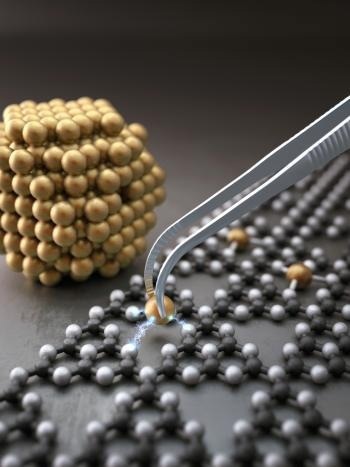
Image Credit: Yale School of Engineering & Applied Science
In the past few years, nanoscale catalysts have gained a lot of focus in the area of water treatment. Materials at the nanoscale come with several unique and useful features to offer. Lately, scientists have been discovering the potential of single-atom catalysts. Despite being tinier than nanomaterials, such catalysts could provide much more efficiency.
We didn’t have this capability before, but now we are basically loading single-atom metals, atom by atom, onto the substrate. And that’s great, because you can utilize all of the atom.
Prof. Jaehong Kim, Henry P. Becton Sr. Professor, Chemical & Environmental Engineering, Yale School of Engineering & Applied Science
As the commonly used materials for catalysts can be very costly, efficiency is vital. For example, palladium (going for approximately $2,000 per ounce now) is a metal that is usually utilized for catalysts.
A quick comparison reveals why single-atom catalysts have created so much curiosity. In nanoscale form, 50 nm of palladium costs around $37 to occupy a region of around 250 m2. At the surface, only over 2% of its atoms are exposed. Contrarily, palladium costs just 17 cents to occupy a region larger than 50 football fields in the single-atom form. With 100% atom exposure at the surface, it cannot be beaten for efficiency.
One drawback of single-atom catalysts is that some conditions can reduce their catalytic performance. To resolve it, scientists have now started developing catalysts that consist of a small cluster of atoms called ensembles. These clusters comprise only three or four atoms, rather than the thousands of atoms that build a nanomaterial.
But they exhibit properties more like a single atom because they’re such a small cluster, and the atoms are all exposed at the surface.
Prof. Jaehong Kim, Henry P. Becton Sr. Professor, Chemical & Environmental Engineering, Yale School of Engineering & Applied Science
Scientists are yet to figure out the ideal ways to regulate the properties of these ensemble structures and enhance their performance, as this material design is relatively new even now. For example, completely isolated single-atom catalysts can be improved by including some elements around the metals. Kim and his study group explored whether atom ensembles can be manipulated in the same way. Their study is the first to investigate the potential of doing so.
Kim made a system with a catalyst with an ensemble of palladium atoms, developed to reduce the carcinogen bromate in water. They introduced the non-metal elements nitrogen, sulfur, and boron next to the atom ensembles. The overall findings recommended an enhancement in the catalytic performance of the system. Kim said that it is a promising sign, particularly because water treatment requires to be as inexpensive as possible.
Ultimately, we are hoping to have a highly efficient device that has this catalyst to destroy pollutants in water, because it is going to be so much cheaper and efficient than other material designs.
Prof. Jaehong Kim, Henry P. Becton Sr. Professor, Chemical & Environmental Engineering, Yale School of Engineering & Applied Science
Journal Reference:
Huang, D., et al. (2023) Enhancing the activity of Pd ensembles on graphene by manipulating coordination environment. Proceedings of the National Academy of Sciences. doi.org/10.1073/pnas.2216879120.